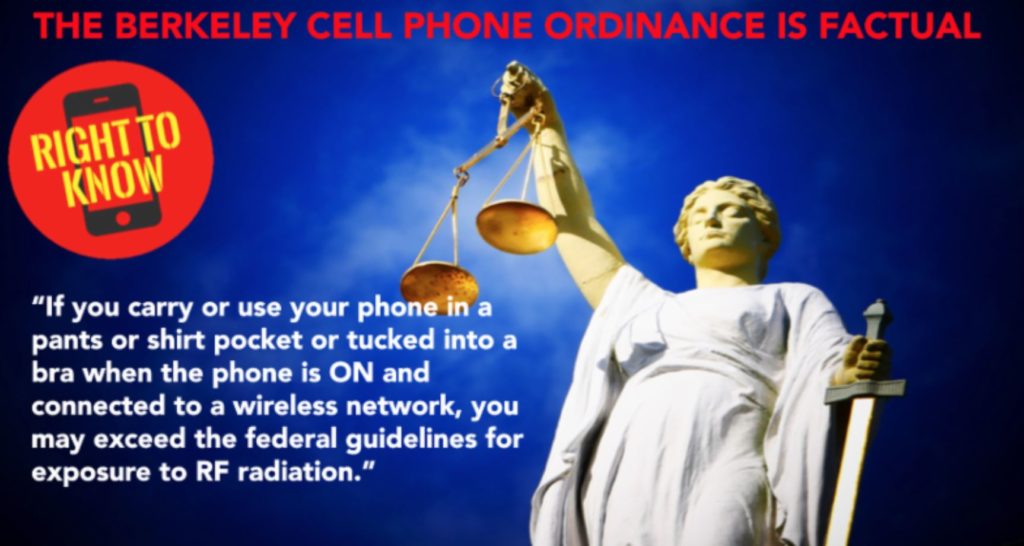 By B.N. Frank
By B.N. Frank
On July 2, a federal appeals court upheld the “Cell Phone Right to Know” law adopted in May 2015 by the City of Berkeley. This affirms Berkeley’s right to require cell phone retailers in the city to notify prospective customers about cell phone manufacturers’ safety guidelines to ensure consumer safety.
This ordinance took many years of hard work and media coverage to make it happen. Thanks to all who testified, fought and never gave up. It’s truly an inspiration for all Americans to fight for the same in local, state, and federal legislation in order to ensure consumer safety.
From Environmental Health Trust:
A landmark 9th U.S. Circuit Court panel has upheld the City of Berkeley’s cell phone right to know ordinance. That ordinance requires retailers to inform consumers that cell phones emit radiation that can exceed federal cell phone radiation limits when close to the body. In upholding this decision, the panel concluded that the public health issues at hand were “substantial” and that the “text of the Berkeley notice was literally true,” and “uncontroversial.”
Further, the panel determined that the Berkeley ordinance did not constitute preemption.
“Far from conflicting with federal law and policy, the Berkeley ordinance complemented and enforced it.”
The panel held that Berkeley’s required disclosure simply alerted consumers to the safety disclosures that the Federal Communications Commission required, and directed consumers to federally compelled instructions in their user manuals providing specific information about how to avoid excessive exposure.
Industry is expected to appeal for a full court en banc review, but this reviewing “panel concluded that CTIA had little likelihood of success based on conflict preemption.”
[…]
The Berkeley Cell Phone Right To Know Ordinance requires retailers post a notice with the following text.
“The City of Berkeley requires that you be provided the following notice:
“To assure safety, the Federal Government requires that cell phones meet radiofrequency (RF) exposure guidelines. If you carry or use your phone in a pants or shirt pocket or tucked into a bra when the phone is ON and connected to a wireless network, you may exceed the federal guidelines for exposure to RF radiation. Refer to the instructions in your phone or user manual for information about how to use your phone safely.”
Excerpts from The CTIA-v-Berkeley-9th-Circuit-opinion-7-2-2019
“The panel affirmed the district court’s denial of CTIA’s request for a preliminary injunction that sought to stay enforcement of a City of Berkeley ordinance requiring cell phone retailers to inform prospective cell phone purchasers that carrying a cell phone in certain ways may cause them to exceed Federal Communications Commission guidelines for exposure to radio-frequency radiation.”
“CTIA argues that Berkeley’s compelled disclosure is not “purely factual” within the meaning of Zauderer. We disagree. For the convenience of the reader, we again provide the full text of the compelled disclosure: The City of Berkeley requires that you be provided the following notice: To assure safety, the Federal Government requires that cell phones meet radio-frequency (RF) exposure guidelines. If you carry or use your phone in a pants or shirt pocket or tucked into a bra when the phone is ON and connected to a wireless network, you may exceed the federal guidelines for exposure to RF radiation. Refer to the instructions in your phone or user manual for information about how to use your phone safely.
The text of the compelled disclosure is literally true.”
“Based on the foregoing, we conclude that CTIA has little likelihood of success on its First Amendment claim that the disclosure compelled by the Berkeley ordinance is unconstitutional.”
“Given the FCC’s requirement that cell phone manufacturers must inform consumers of “minimum test separation distance requirements,” and must “clearly disclose[ ]” accessory operating configurations “through conspicuous instructions in the user guide and user manual, to ensure unsupported operations are avoided,” we see little likelihood of success based on conflict preemption. Berkeley’s compelled disclosure does no more than alert consumers to the safety disclosures that the FCC requires, and direct consumers to federally compelled instructions in their user manuals providing specific information about how to avoid excessive exposure. Far from conflicting with federal law and policy, the Berkeley ordinance complements and reinforces it.”
For more information, visit Environmental Health Trust and SaferEMR
Subscribe to Activist Post for truth, peace, and freedom news. Follow us on Minds, Twitter, Steemit, and SoMee.
Provide, Protect and Profit from what’s coming! Get a free issue of Counter Markets today.

Be the first to comment on "Court Rejects Industry Appeal and Upholds Berkeley, CA “Cell Phone Radiation Right To Know” Ordinance"